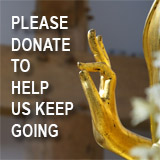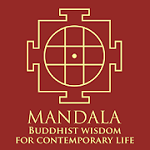
|
|
|
Home Asia Pacific South East Asia Myanmar Myanmar Protest News Sons of Buddha in Prison: Burmese Activists Monksby Tate Naing, The Irrawaddy, September 25, 2007Rangoon, Burma -- Burma has been a Buddhist country for thousands of years. People who believe in Buddhism adore the Buddha, the Dhamma and the Sanghathey are called the three sacred treasures. They revere the Sangha (monks) as sons of Buddha.
However, my own experience regarding the SPDC’s brutal treatment of monks is completely different from the daily news released by the SPDC media. I lived in the regime’s prisons (Insein, Prome and Thayet) for nearly three years. This was a bitter time in my life. I could stand and struggle because I had expected and prepared for the worst. Yet, when I witnessed and experienced the daily life of imprisoned monks and the cruel treatment the prison authorities subjected them to, I felt indescribable emotions. During my time in the No. 5 Ward of Insein Prison, I lived with Ven. Aubartha, Ven. Waryama, Ven. Zawtika and Ven. Kawthanla, all from Shwephonepwint Monastery in Rangoon. They participated in the monks’ boycott called "pattam nikkujjana kamma," or “overturning the bowl,” a refusal to accept alms from members of the armed forces and their families in October 1990. As a result, they were each sentenced to three years in prison with hard labor under the Emergency Provisions Act, Section 5(J), and Penal Code Article 295, which, ironically, prohibits insults directed at religion. While we were in this ward, more than 50 prison authorities came into the ward and ordered all prisoners, except prisoner-in-charge, the thugs, to sit in the emergency sitting position at about 3 a.m. in the morning on November 22, 1991. Then the prison authorities called the names of political prisoners on the list to be transferred one by one out of the ward. My name was on the list, so I made my bed and went to the door. At the door, I risked standing and staring at the venerable monks because I wanted to pay obeisance to them for the last time before my transfer. What I saw was the venerable monks sitting with folded legs, touching the floor with their foreheads and stretching their arms forwards. This was called paunsangyi or emergency position in prison. I felt as if the venerable monks were doing obeisance to the prison authorities. Seeing that scene, I was in a total daze. I did not know how long it lastedI regained awareness when I was hit on my back three or four times. Then, tears stole down my face. I realized the tears were not because of the pain from beatings. One hundred political prisoners including six monks were transferred to the remote Thayet Prison. Among us was the Ven. Meggin Sayardaw, who was over74 years old at the time, but he was shackled in irons and transferred nonetheless. It took two hours for us to walk from Thayet quay [a ferry boat landing onthe Irrawaddy River] to Thayet Prison. The prison authorities, policemen and soldiers were walking beside us and beat us with bludgeons and gun butts all the way to the prison while we were walking. Our slippers had been taken away when we left Insein Prison, and we had to walk with bare feet through thorns, bushes and wild grass the whole way. I saw the Ven. Meggin walking, holding the iron shackles in one hand and his mattress in the other hand. When I carefully looked, the legs of the venerable monk were stained with blood. The authorities treated monks like that. This was odious. In October 1991, I think, there was a monk in Insein Prison Ward No. 5 named Ven. Pyi Kyaw. He was once slapped many times by the ward-in-charge, Aung Htun, for failing to bow as he passed him. The political prisoners at once went to the ward officer Saw Htun and protested about this. He replied that every prisoner had to obey prison rules. Aung Htun refused to apologize to the Ven. Pyi Kyaw. As a result, there was tension between the political prisoners and the thugs-in-charges [criminal gangsters who were appointed as prisoner officers by the prison authorities]. Some courts did not charge monks who participated in the boycott, pattam nikkujjana kamma, as political prisoners under the Emergency Provisions Act, Section 5(J). Instead, some monks were charged under Article 295 for insulting religion. These monks were sent to forced labor camps. A monk from Koehtatkyi Monastery in Rangoon participated in the boycott and was sentenced to three years in prison with hard labor under the Article 295. This venerable monk was taken to a forced labor camp from No. 5 ward in October, 1991. The Ven. Zawtika from Shwephonepwint Monastery was nearly 60 years of age when he fell into bad health in December 1992. He was taken to Insein Prison Hospital but his health was deteriorating. After prison doctors had given up on treating him, he was sent to the guarded ward for prisoners in the basement of Rangoon General Hospital. He passed away soon after he had arrived in the hospital. The hobbled venerable monk was in a white prisoner uniform wearing four kilogram iron shackles when he died. The Ven. Arsara from Thayettaw Monastery in Rangoon was 35 years of age when he was sentenced to 10 years in prison under the Unlawful Associations Act. He suffered from jaundice and chronic fever in Thayet Prison in January 1996. The prison authorities refused his request to be sent to an outside hospital. Only when he was dying was his request granted, and he was sent to Thayet General Hospital. Due to the neglect of the prison authorities, he had to wait for his death while meditating. Two days after he was sent to the hospital, he passed away. The Ven. Bhaddanta Yewata, 52 years old, was arrested on October 19, 1990, and was sentenced to 12 years in prison by a military tribunal because of his leading role in the monk movements opposing the regime. He was transferred from Mandalay prison to the new Ohbo Prison. Due to sleeping on the wet floor in his cell, the lack of medicine and not having enough food, he suffered from kidney failure. He was released in mid-1998. He passed away in January 1999 from a prison-related disease. Monks, sons of Buddha, are being tortured and cracked down upon in interrogation centers, in concentration camps, in prisons and in forced labor camps. There are many questions, such as: “Why are these things happening?” “Who is responsible for this?” “Who is guilty?” and so on. I can’t believe or understand why a group of so-called Buddhists in a majority Buddhist country dare to commit these ultimate sins. I don’t understand where they get these evil minds to commit such atrocious religious violations. Time after time, I realize these disastrous events occur because the behavior of the military dictators and the conditions of the country are the same, like mirror images of each other. When I realize this, I see that being a Buddhist is beside the point. Whether or not the oppressors are privileged in the power structure, the capital sharing system or the social system also does not matter. The key point is that people’s behavior of bullying and discriminationabove all, human rights violationshave become habitual in Burmese society. This is aside from the idea that people who hold power or receive rich rewards in money violate human rights to stay to receive those benefits. Military despotism molds the people’s behavior to accept human rights violations and bullying as part of a tradition. I have observed many people with distorted mentalities willingly harass and abuse each other. Nevertheless, we activists have to deeply consider how to eliminate not only the official despotism, but also these ingrained traditions. I have decided and vowed to carry out this duty as well as I can. ---------------- |
 Get your Korean Buddhist News here, brought to you by BTN-Buddhist Channel |
 |
 The Mandala app brings together Buddhist wisdom and meditation techniques with the latest insights of psychology and neuroscience to handle the challenges and complexities of modern life. The App offers a series of engaging talks and conversations with experts on a wide variety of topics, such as managing stress, dealing with adversity, developing greater resilience, cultivating empathy and compassion, creating healthy relationships, and many more. These topics are explored to help find greater peace, meaning and joy in our lives. Our panel of experts include Dr, Thupten Jinpa, Daniel Goleman, Kelly McGonigal and others.FREE DOWNLOAD here |
| Point
your feed reader to this location |
| Submit an Article |
| Write to the Editor |

